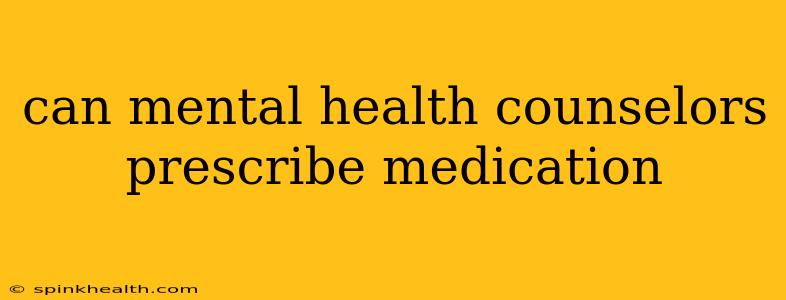Can Mental Health Counselors Prescribe Medication?
No, mental health counselors generally cannot prescribe medication. This is a crucial distinction between different mental health professionals. While they play a vital role in providing therapy and support, the authority to prescribe medication rests with other licensed professionals.
Let's break down the differences and clarify who can prescribe medication for mental health conditions.
What is the difference between a mental health counselor and a psychiatrist?
This is a key point of confusion. The main difference lies in their training and licensing:
-
Psychiatrists: Are medical doctors (MDs or DOs) who have completed specialized residency training in psychiatry. This extensive medical training allows them to diagnose mental illnesses and prescribe medication. They often integrate medication management with therapy, but their primary focus is on the biological aspects of mental health.
-
Mental Health Counselors: Typically hold a master's degree in counseling or a related field. Their training focuses on therapeutic techniques and providing support to clients navigating mental health challenges. They are skilled in various therapies like Cognitive Behavioral Therapy (CBT), Dialectical Behavior Therapy (DBT), and others. However, they lack the medical training to prescribe medication.
What other professionals can prescribe medication for mental health conditions?
Besides psychiatrists, several other professionals can prescribe medication, depending on the state's regulations:
-
Psychiatric Nurse Practitioners (PMHNPs): Advanced practice registered nurses with specialized training in mental health who can diagnose and prescribe medication.
-
Licensed Clinical Social Workers (LCSWs) with Prescriptive Authority: In some states, LCSWs can obtain prescriptive authority after completing additional education and training. This is not universally available, however.
-
Psychologists: In a limited number of states, psychologists with specific training and licensing can prescribe medications. This is still relatively uncommon.
What should I do if I need medication for a mental health condition?
If you are experiencing symptoms of a mental illness and believe you may need medication, it's crucial to seek the appropriate professional. A good first step might be to schedule an appointment with your primary care physician. They can conduct an initial assessment and refer you to a psychiatrist, PMHNP, or other qualified professional who can provide medication management.
What services do mental health counselors provide?
Mental health counselors offer a wide range of therapeutic services, including:
- Individual Therapy: Providing a safe space to explore thoughts, feelings, and behaviors.
- Group Therapy: Connecting with others facing similar challenges.
- Couples or Family Therapy: Addressing relationship dynamics and improving communication.
- Crisis Intervention: Providing immediate support during times of distress.
- Stress Management Techniques: Teaching coping mechanisms for managing stress and anxiety.
- Life Skills Training: Helping develop skills to navigate daily life challenges.
While counselors don't prescribe medication, their role in providing therapy is invaluable in managing mental health conditions, often in conjunction with medication prescribed by other professionals.
Can a mental health counselor work with someone who is taking medication?
Absolutely! Mental health counselors often collaborate with psychiatrists or other prescribing professionals. They can provide therapy to address underlying issues, support medication adherence, and help clients develop coping strategies. This integrated approach can lead to the most effective treatment outcomes.
This comprehensive approach emphasizes the importance of teamwork among different mental health professionals to offer holistic care. Choosing the right professional for your specific needs is essential for achieving optimal mental health.

